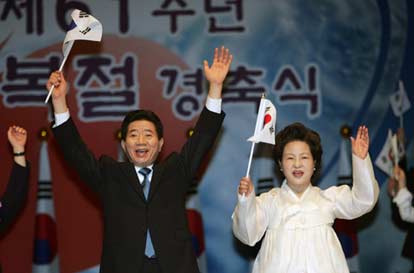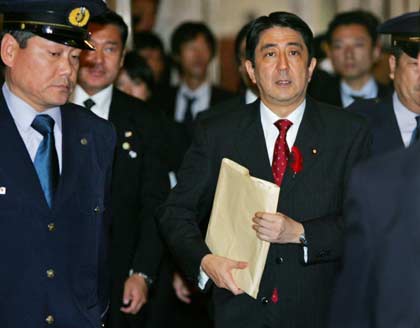Beijing -- President Roh Moo-hyun of the Republic of Korea (ROK) will pay a
working visit to China on October 13 at the invitation of Chinese President Hu
Jintao, Chinese Foreign Ministry spokesman Liu Jianchao announced Wednesday.

South Korea's President Roh Moo-hyun (L) and his wife Kwon Yang-sook
wave the national flag at a ceremony, marking the end of World War Two and
Japanese rule 61 years ago, in Seoul August 15, 2006.
[Reuters] |
This is the second time for Roh to visit China since he took office in 2003.
Roh paid a state visit to China for the first time in July, 2003, during which
China and the ROK agreed to build an all-round cooperative partnership.
China and ROK have maintained smooth cooperation in politics, economy, trade,
culture, education, science and technology, environment protection and the
military fields. They have had good coordination in international and regional
issues, observers said.
The smooth cooperation between China and the ROK has made important
contributions to regional peace and development, Chinese President Hu Jintao
said upon his state visit to the ROK in November 2005, when the ROK recognized
China's market economy status.
China is the biggest trading partner of ROK and the No. 1 destination of
investment made by ROK's entrepreneurs. The ROK is the fourth largest trading
partner and third largest import source of China. Trade volume between China and
the ROK exceeded US$100 billion in 2005.
The two countries set the goal of increasing bilateral trade volume to US$200
billion by 2012.
Statistics show that there are over 420 flights flying between China and the
ROK every week. The ROK has become the biggest tourism source nation for China
in 2005, and the bilateral tourism cooperation has huge potential, according to
China's National Tourism Administration.
Moreover, the two countries closely cooperate in the process of resolving the
nuclear issue on the Korean Peninsula, making joint contribution to realizing
denuclearization of the peninsula.
Chinese President Hu Jintao said over phone talks with Roh last July that
China highly values relations with the ROK and will work with the ROK to boost
the development of China-ROK comprehensive cooperative partnership.
Abe To Visit China
The Chinese Foreign Ministry also announced Wednesday that Japanese Prime
Minister Shinzo Abe will pay an official visit to China from October 8 to 9.

Japanese Prime Minister Shinzo Abe (R) is escorted by guards
as he arrives at the Upper House plenary session at the parliament in
Tokyo October 4, 2006. The Chinese Foreign Ministry announced Wednesday
that Japanese Prime Minister Shinzo Abe will pay an official visit to
China from October 8 to 9. [Reuters] |
"China and Japan reached a consensus on overcoming the political obstacle to
the bilateral relationship and promoting the sound development of bilateral
friendly and cooperative relationship," Liu said.
"Accordingly, at the invitation of Chinese Premier Wen Jiabao, Japanese Prime
Minister Shinzo Abe will pay an official visit to China from October 8 to 9,"
the spokesman said.
The Sino-Japanese relations have been soured by former Japanese Prime
Minister Junichiro Koizumi's repeated visits to the Yasukuni Shrine, where
Japan's war dead, including 14 class-A war criminals in WWII, are honored.
The leaders of the two countries halted exchange of visits since Koizumi paid
a homage to the war shrine in 2001.
Chinese President Hu Jintao said last March in a meeting with the heads of
seven Japan-China friendship organizations that the difficult situation in
China-Japan relationship was not caused by the Chinese side or the Japanese
people.
The sticking point is that the major obstacle in China-Japan relationship was
Japanese leader's insistence on visiting the shrine, Hu said.
China always values its relationship with Japan, considering it one of the
important bilateral relations in the world, he said. The Chinese side has made
unswerving efforts to improve China-Japan relations.
The president said the China's stance on its relationship with Japan is
"clear", "consistent" and "unswerving."
China will, as it always does, handle China-Japan relationship from a
strategic and long-term point of view and is committed to China-Japan peaceful
coexistence, long-term friendship, mutually beneficial cooperation and common
development, he said.
The Chinese side will abide by the principles set in the three Sino-Japanese
political documents, continue to "take history as a mirror and look into the
future," and properly settle the problems between the two sides through equal
consultations, and maintain China-Japan friendship, said Hu.